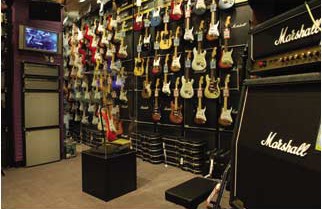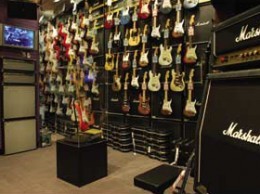Guitar Center announced that it emerged from Chapter 11 bankruptcy proceedings after its reorganization plan was confirmed in federal court on Dec. 17, less than a month after the company filed for bankruptcy.

The plan puts into motion a collection of previously announced recapitalizations, including exit financing and the abolishment of all of Guitar Center’s pre-petition debt. Guitar Center was able to shed almost $800 million in debt and gained $165 million in new equity funding.
Recapitalizing also helped the company in other ways. The move improved Guitar Center’s liquidity, and going forward the company states it will be able to invest in strategic growth initiatives and better implement its business plan because of the recapitalization. Guitar Center did not close any stores due to the bankruptcy but did state that it is looking for opportunities to “optimize” its real estate footprint.
“We are excited to have gained the financial and operational flexibility we need to reinvest in our business and support our long-term sustainable growth, allowing us to deliver on our mission of putting more music into the world,” Ron Japinga, Guitar Center’s CEO, said in a company news release. “We look forward to strengthening our business and to building upon this momentum as we enter this next exciting chapter.”
Details about the company’s business plan and how it planned to ride out the remainder of the pandemic weren’t immediately available. Guitar Center responded to the Pacific Coast Business Times’ email but refused to comment.
Guitar Center has almost 300 stores throughout the United States, and sister brand Music & Arts has more than 200 stores. It is the largest privately held company based in the Tri-Counties, with an estimated revenue of more than $2 billion annually.
In its bankruptcy filing, the company listed both its assets and liabilities in the $1 billion to $10 billion range.
As part of the recapitalization, Guitar Center’s parent company released a new series of senior preferred equity plus cash to the company’s prepetition secured note holders, and a new series of junior preferred equity to Guitar Center’s unsecured note holders. Additionally, the company’s indirect parent received a $165 million common equity investment from funds managed by Ares Management, Brigade Capital Management and The Carlyle Group. According to the press release put out by the music chain, those three firms now own all of the common equity of Guitar Center.
Guitar Center also entered into a new secured asset-based revolving financing facility that allows the company to borrow up to $375 million. That facility is being funded by several banks, including Wells Fargo and JPMorgan Chase. The company got additional cash from the net proceeds of the $350 million note issuance earlier in December; Guitar Center said money from that transaction was used to support the recapitalization transactions.
Several organizations have filed claims against Guitar Center that were not included in the initial bankruptcy filings. The Internal Revenue Service is the top claimant; it filed four of the biggest claims against the company, to the tune of $8.74 million owed.






 Print
Print Email
Email

















